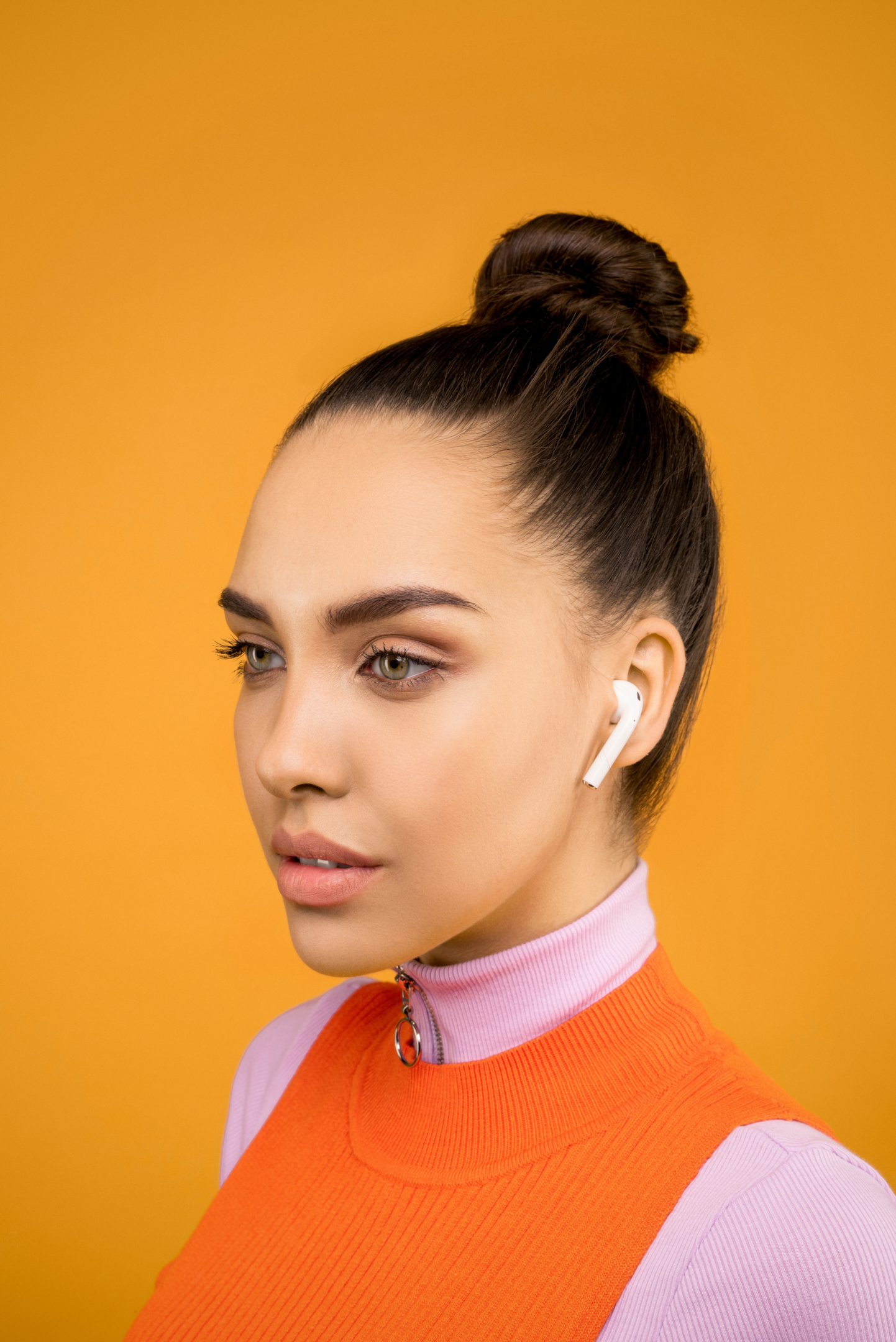Are EarPods Bad For You?

written by Laurie C Peters, EMF Hygiene expert, and Blogger
Are EarPods bad for you? I get this question often. But I am also asked if it’s “AirPods,” “EarPods,” or “Earbuds?” For the sake of this article, I will use “AirPods” and “Earbuds” fairly interchangeably. Though please note, “AirPods” specifically references the “Earbuds” made by Apple. And “EarPods” is not a legitimate term though many use it to search for the same answers I will address in this article.
That said, as more people become aware of the dangers of wireless earbuds, they want to know about their impact on the inner ear, middle ear or ear canal. As well, many wonder if these ear pieces can contribute to hearing loss or even brain damage. Another burning question is whether over-the-ear headphones are safer than wireless devices. Finally, is there such a thing as earbud safety? We will discuss all of this and more in the following article.

But first, How do AirPods work?
AirPods (aka EarPods) have a small speaker built into each earbud. They are designed to fit comfortably inside your ear, blocking out ambient noise while playing music or other audio. They are connected to your iPhone or other device via Bluetooth or with a lightning connector, which transmits audio data.
So then, what is bluetooth technology and is it a health risk?
Bluetooth is a wireless technology that allows devices to communicate with each other over short distances. It was first developed in the mid-1990s as a way to replace cables between devices such as mobile phones, laptops, and desktop computers. Bluetooth technology uses radio waves to connect electronic devices up to 33 feet apart from each other.
Has Bluetooth evolved over time?
Bluetooth has evolved over time to include various protocols that enable seamless connectivity between devices. Some of the most common protocols include A2DP for audio streaming, AVRCP for controlling music playback, and HFP for hands-free calling. With Bluetooth, you can connect a variety of devices such as smartphones, laptops, headphones, aka Ear Buds, speakers, and even cars.
Bluetooth technology has come a long way since it was first introduced. With the latest version of Bluetooth 5.2, users can experience improved audio quality, increased range, and faster pairing times. This means you can enjoy your music without any interruptions, even when you’re far away from your device. The technology is also energy-efficient, which means it’s gentle on your device’s battery life.
Why people like Bluetooth
One of the many benefits of Bluetooth is that it’s incredibly easy to use. You don’t need any technical expertise to connect your devices, and it only takes a few seconds to pair them. Once paired, you can enjoy a seamless and reliable wireless connection between your devices. For example, if you want to connect your smartphone to your car’s sound system, all you need to do is turn on the Bluetooth on both devices, and they will quickly pair with each other.
That said, the question remains, does Bluetooth pose health risks?

Should you worry about wireless headphones?
Are you concerned that your AirPods are bad for you? Do you wonder about headphone safety in general and especially Bluetooth technology? If so, you are not alone. With more science-backed information suggesting that there are health concerns associated with wearing earbuds, there is no wonder some are opting to not wear earbuds. Here are just a few reasons why people are concerned:
- increased hearing loss associated with Earbuds
- noise-induced hearing loss associated with maximum volume use
- increased cancer risk associated with EMF-emitting devices such as Bluetooth technology including earbuds
- radiation exposure to the body
Can Airpods cause hearing loss?
Some studies have shown that listening to music through earbuds at high volumes can cause permanent hearing damage. However, this is not specific to AirPods, but rather to in-ear headphones in general. That said, Apple has implemented safety features to protect users from listening to music at excessively high volumes. For instance, you might have noticed the new alert on your iPhone notifying you when the volume has exceeded a safe level.
Can Airpods cause ear infections?
It is possible for any earbuds to cause ear infections, but it’s unlikely for several reasons. Firstly, earbuds are designed to fit comfortably inside your ear and won’t cause any damage to the ear canal. Secondly, earbuds don’t get dirty easily as they don’t actually sit on the ear, so the risk of bacterial build-up is quite low.
Can Airpods cause brain damage?
There is no scientific evidence to support the idea that using EarPods, be them AirPods or another variety, can cause damage to your brain. Any claims to the contrary are simply myths.
Can AirPods Cause Brain Cancer?
some studies have suggested that using certain types of cell phones or headphones for extended periods may increase the risk of brain tumors and other forms of cancer. Thus, it stands to reason that Earbuds would also be a risk.
Do AirPods give off EMFS?
First, let’s clarify what we mean by EMFs. Electromagnetic fields are invisible areas of energy that are generated by electrically charged objects. These fields are measured in units called hertz (Hz) and can be found in a wide range of technologies we use today.
What is RF?
RF stands for radio frequency. One of the most common concerns about Ear Buds is that they emit RF radiation, a type of EMF that comes from wireless technology. Many studies have been conducted over the years to explore the potential risks of RF radiation on human health and it has been considered a carcinogen.
Do Your Research And Stay Up On The Findings

It is important to be aware of the research and take steps to minimize your family’s exposure to EMFs as much as possible.
Some simple precautions you can take include:
– Encouraging your children to use Ear Buds or headphones sparingly and for short periods
– Using wired headphones instead of wireless ones whenever possible
– Keeping electronic devices away from your child’s head and body when they are not in use
– Opting for devices with lower levels of RF radiation, such as those that comply with the Specific Absorption Rate (SAR) guidelines set by the Federal Communications Commission
–Keep volumes at a low and safe level
–Employ EMF mitigation techniques and tools
–Get a meter to test your body when using Earbuds
Should You choose to use Ear Buds Responsibly, Consider these…

I like these Liberty 4 NCs for several reasons
All-New True-Wireless Earbuds Reduce Noise By Up to 98.5%
- Reduce noise by up to 98.5% with our advanced noise-canceling system
- Adaptive ANC 2.0 adapts to ears and environment in real-time
- 11mm drivers, Hi-Res Wireless, and LDAC technology for crisp sound
- Full adjustable EQ with Hear ID 2.0 for a tailored sound profile
- 10/50 hours of battery for long-lasting quiet
- Fast Pair and Bluetooth 5.3 multi-point connection
- IPX4 water resistance against spills and rain
- 6 mics and an AI algorithm enable crystal-clear calls

Plus they come in several cool colors including the above light blue and this pink! $99.99
Calmer: Reduce Stressful Background Noise
Small product. Huge benefits.

This small device is worn in the ear to reduce stress and sells for $29.95. Calmer features a unique technology that reduces distortion in our ears and calms your environment in a subtle, but potentially life-changing way.
• Reduces stressful frequencies without muffling sound
• Perfect for: decreasing over all stress levels, those with sensitive hearing, those with sensitivity to sound associated with autism and aspergers syndrome, hyperacusis, misophonia & help with other hearing conditions
• Soothes sound sensitivities & helps you feel calmer
Helpful in reducing stress while…
• Travelling / commuting
• At work, at school, at home
• In noisy areas like concerts and movie theaters
• Any other use where you want a calmer environment
• Can be worn during sleep to deeply relax the body
How it works:
Calmer sits barely visible in the ear and uses revolutionary, non-electric technology to reduce mid and high frequency distortion without having a detrimental effect on our hearing.
The result is a natural way to minimise today’s constant barrage of environmental noise stressors which have a negative impact on our mental and physical well-being.
Calmer reduces stress by removing distortion that would usually trigger the human ‘fight or flight’ response. While this response was a vital part of our evolution to alert us to the slightest sound or threat, in today’s modern world where we no longer need to be alert to the snap of a twig, this added resonance is loading us with unnecessary stress.
Calmer specifically helps reduce noises that causes stress and anxiety. They do this without reducing the volume so you don’t feel disconnected from the world.
In Conclusion
To prevent hearing damage, it’s advisable to not listen to music or other audio at high volumes for prolonged periods. Also, avoid sharing earbuds with other people, as this increases the risk of infection.
As a concerned parent, it’s essential to educate your children on healthy and safe habits when it comes to Earbuds and other technology. You can help by encouraging them to take breaks from using Earbuds, avoid sharing headphones, and keep the volume at a safe level. Lastly, always remember that moderation is key. As well, as keep up on evolving research and science. Lastly, explore the variety of EMF mitigation tools available.







